VERBASCUM PHLOMOIDES AND SOME CREATURES ON IT
Today I drove fifty kilometers to the small town called Zminj. After buying some stuff there, in the monthly outdoor market that happens on Wednesdays at the edge of town, I drove a kilometer or two more toward one of the neighboring villages and stopped by the side of the road to search for something to observe and photograph through my macro lens.
In this opening photograph, you can see the Stictopleurus crassicornis, a bug from the Rhopalidae family. The photograph was taken fairly early in the morning. If you enlarge the picture by clicking on it, you'll see that the wooly leaf on which the bug is standing is covered with a multitude of tiny droplets. That leaf ...
.... belongs to the Verbascum phlomoides, a plant from the Scrophulariaceae family. Here you can see a young plant that has nothing to show besides its leaves. The sun was still low about the horizon, a good chunk of the roadside meadow was therefore in the shade, and the magic created by the morning dew was still glittering on those juicy leaves.
It was too early, too cold, and too humid for the bug to be fast and active. The insect was posing still for these photographs, and that's quite fortunate because I needed a long exposure to get a good shot in low ambient light. In a macro shot, the flash would have ruined the magic created by the many droplets.
This spider ...
... was photographed on one of the tall, completely developed plants in the sunny part of the meadow.
It's a jumping spider. The name of the species is Philaeus chrysops, and this is a female. Males are more showy, with some vivid red body parts.
The same spider is staring directly at you in this shot.
Females are less exuberant, but their inconspicuous colors and markings are very variable. You have seen only one type of Philaeus chrysops female in this series of photographs. In the following shot ...
... you can see a different one.
This female has built a silky nest on the same plant.
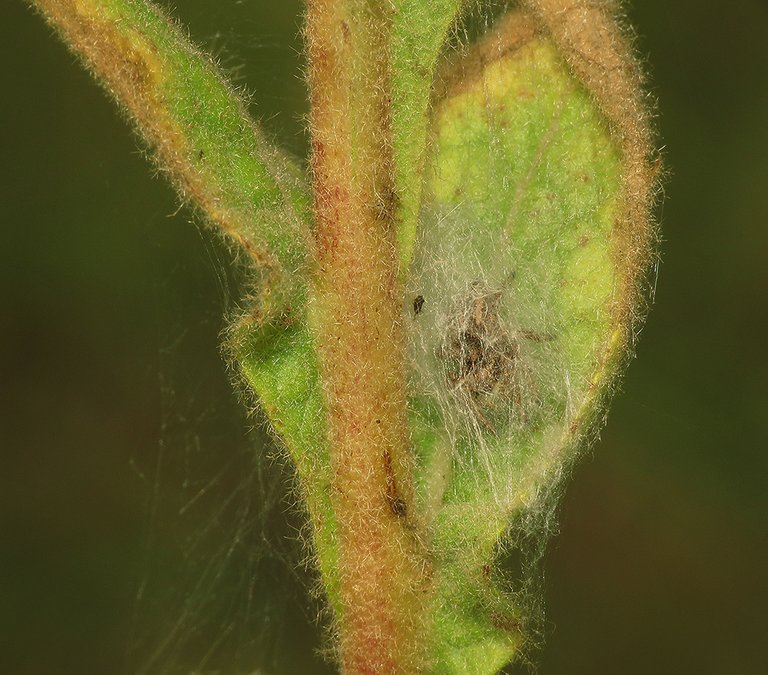
Here you can see how the construction looks from a distance. On the wooly leaf, the silk is less noticeable than it would be on a smooth, hairless one, therefore the nest is better hidden.
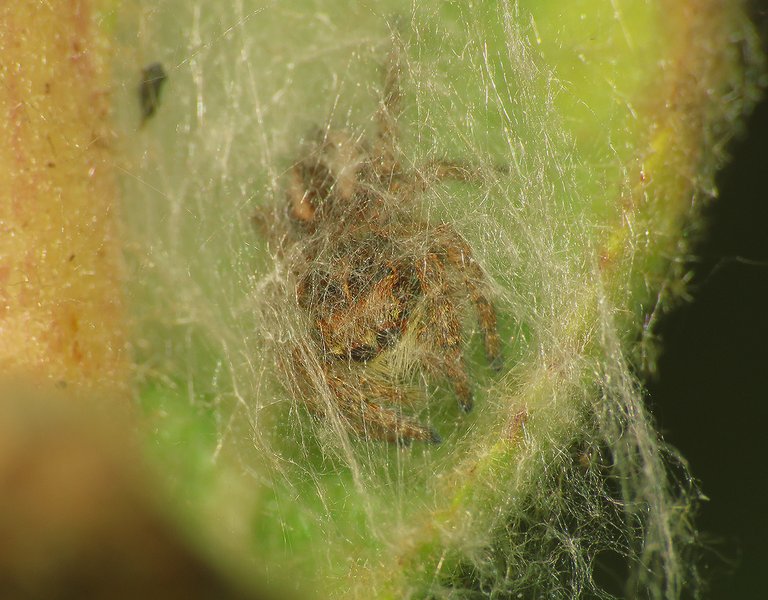
Jumping spiders don't spin webs to catch the prey, but both males and females use the silk in other ways.
Males mainly use it as a thread that helps them navigate the environment, a bit like Spiderman does. Females do that as well, but they also build their nests with it. Generally, jumping spiders have very cute faces, but the cute face of this Philaeus chrysops female surrounded by all that fluffy silk is even cuter than usual.
Verbascum phlomoides is a pretty big herbaceous plant whose basic anatomical features provide many hiding places for small arthropods. You can always find quite a few interesting species among its foliage.
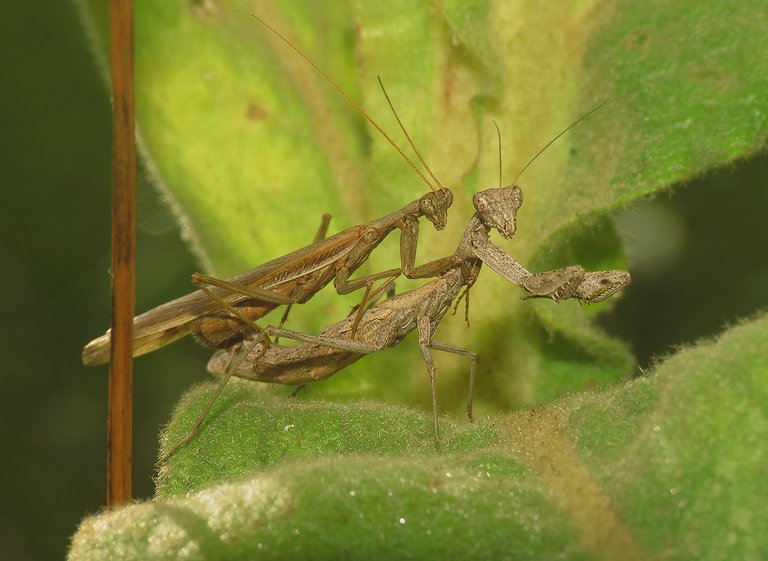
In this unusual scene, you can see two mantises. A male and a female.
The fact that the insects are mating in this and the previous shot is not unusual, they do it regularly, of course. But, if you take a good look at all the details, you'll see that the male looks like a typical winged adult while the slightly bigger female resembles a wingless nymph. That's not how a mating of European mantises (Mantis religiosa) would look and, at first sight, these two looked like European mantises to me. It took me some time to realize that I was looking at different species. These are Ameles decolor, commonly known as Mediterranean dwarf mantis. The females of this species have very short wings.
This long-legged, spider-like arachnid is the Phalangium opilio, a very common harvestman from the Phalangiidae family. In the following photograph ...
... I came closer with the macro lens. The tiny red things on the harvestman's body are arachnids of a different kind. They are larval forms of a mite from the Erythraeidae family. With quite a few very similar species around, I can't tell you which one exactly is this.
With a lot of patience, both from my and the harvestman's side, I was able to come extremely close in this shot and allow you to take a good look at the external anatomy of the tiny larva. In the larval stage, they live a parasitic existence, but adult mites are active little predators.
Here you can see another harvestman of the same kind. While the Phalangium opilio was resting on the flower buds in the middle of the tall stem, a Carpocoris purpureipennis shield bug passed under its long hind legs.
This shield bug was photographed on the top of the plant. The name of the species is Nezara viridula. It's a 5th instar nymph, which means that the immature insect has undergone five moltings. After each molt, the nymph changed not only its size but its appearance as well. Nezara viridula is always present in my garden but the 5th instar nymphs there are different. What's black in the insect shown in the above photograph, is vivid green in those nymphs I encounter every summer in my garden. Never saw this darker version in nature before this encounter, only on the Internet.
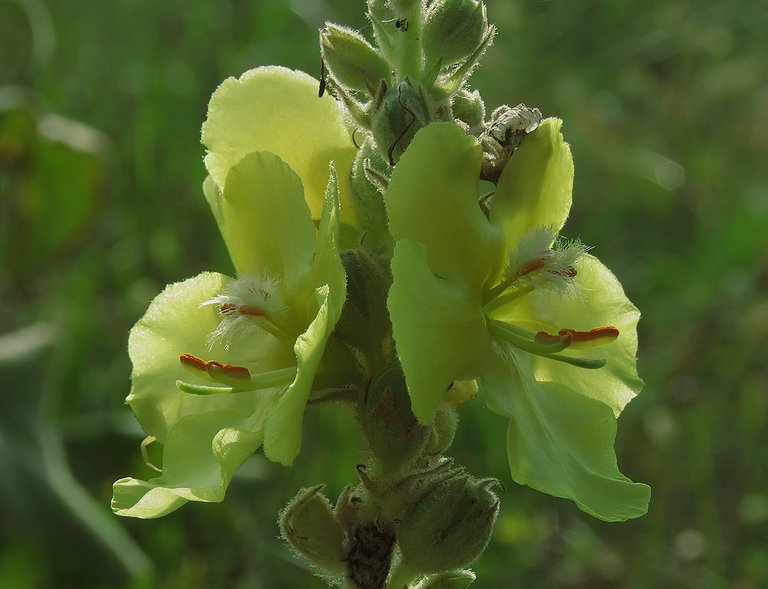
Here you can see two Verbascum phlomoides flowers situated near the top of the tall stem. In the following photograph ...
... the focus is on only one of those flowers.
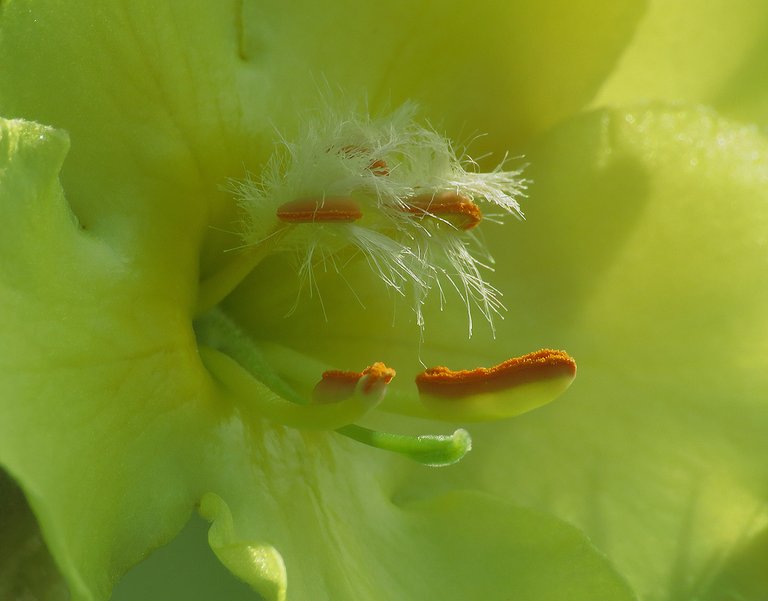
Here I came closer with the macro lens, so you can take a good look at the pistil and anthers in its center.
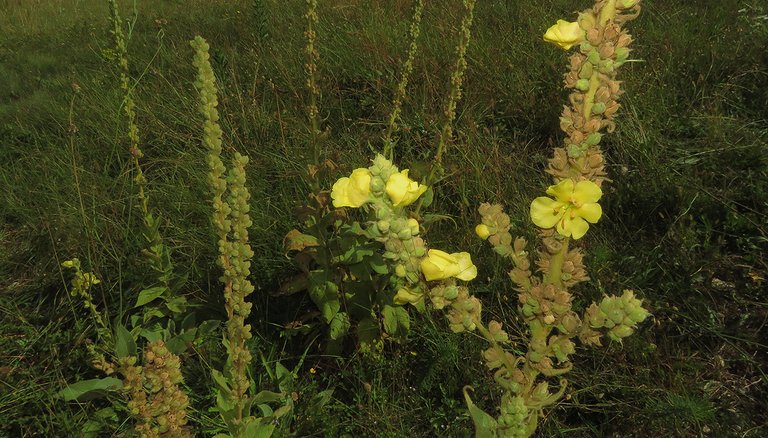
You can see a few more flowers in this wide shot.
The detail shown in this set of four shots was found and photographed on one of the leaves situated low on the plant. Some seed, probably brought by the wind, ended up attached to the hairy surface of the juicy leaf.
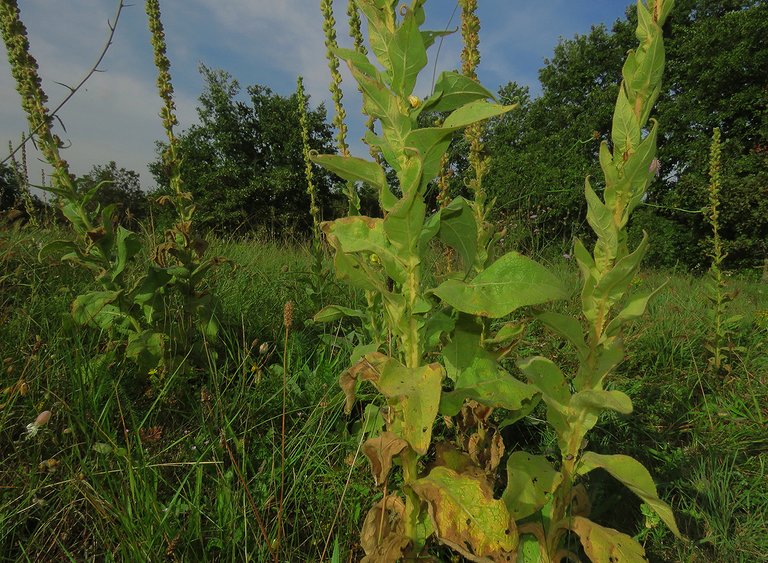
I definitely found more than I expected in an hour or so I spent around the Verbascum phlomoides plants on the meadow by the side of the road.
You can see a well-camouflaged crab spider in this shot.
Heriaeus hirtus is the name of this species from the Thomisidae family.
The following links will take you to the sites with more information about the protagonists of this post. I found some stuff about them there.
https://en.wikipedia.org/wiki/Stictopleurus_crassicornis
https://en.wikipedia.org/wiki/Verbascum_phlomoides
https://en.wikipedia.org/wiki/Philaeus_chrysops
https://en.wikipedia.org/wiki/Ameles_decolor
https://en.wikipedia.org/wiki/Phalangium_opilio
https://en.wikipedia.org/wiki/Erythraeidae
https://en.wikipedia.org/wiki/Carpocoris_purpureipennis
https://en.wikipedia.org/wiki/Nezara_viridula
https://en.wikipedia.org/wiki/Heriaeus_hirtus
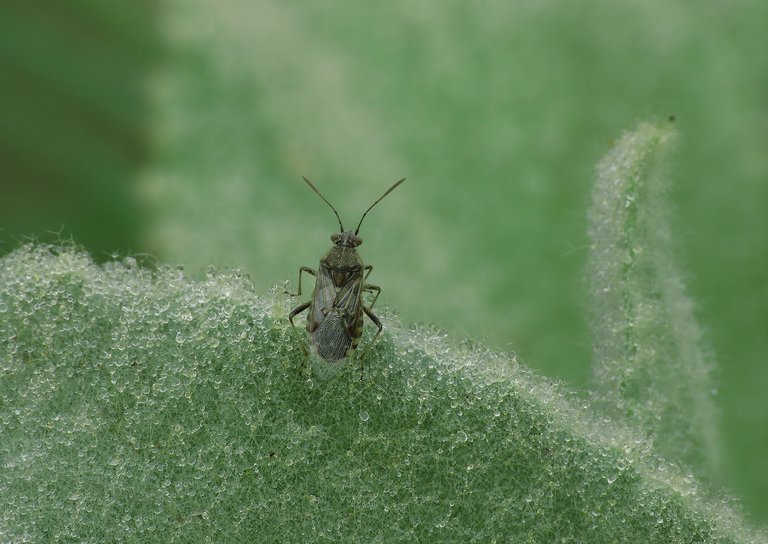
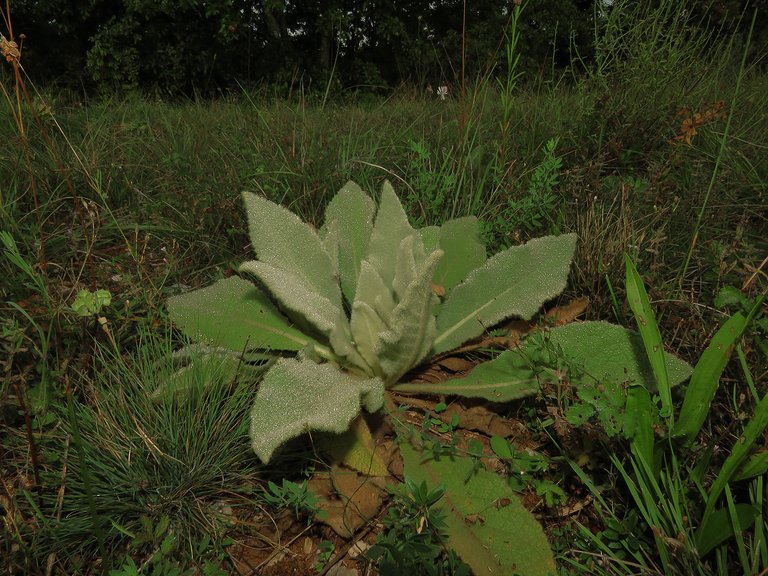
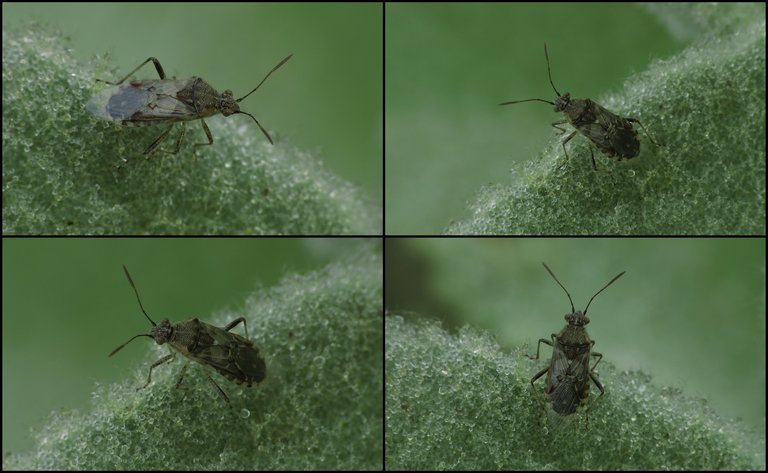

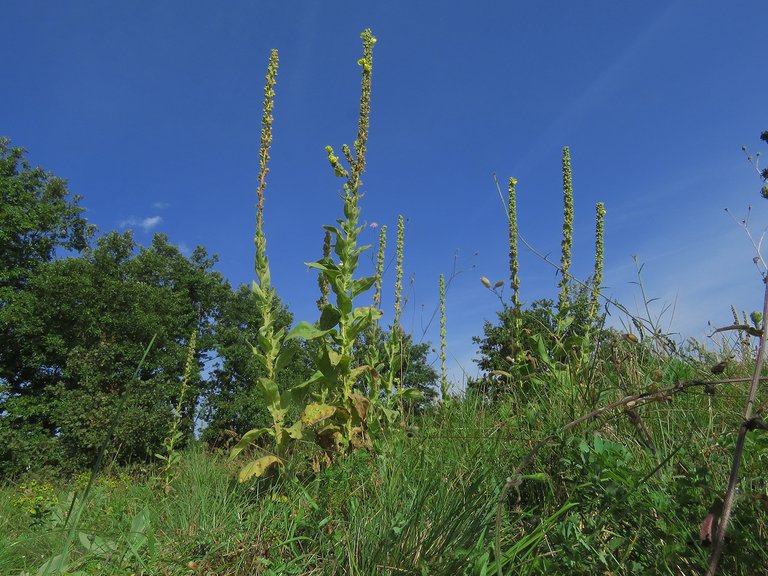
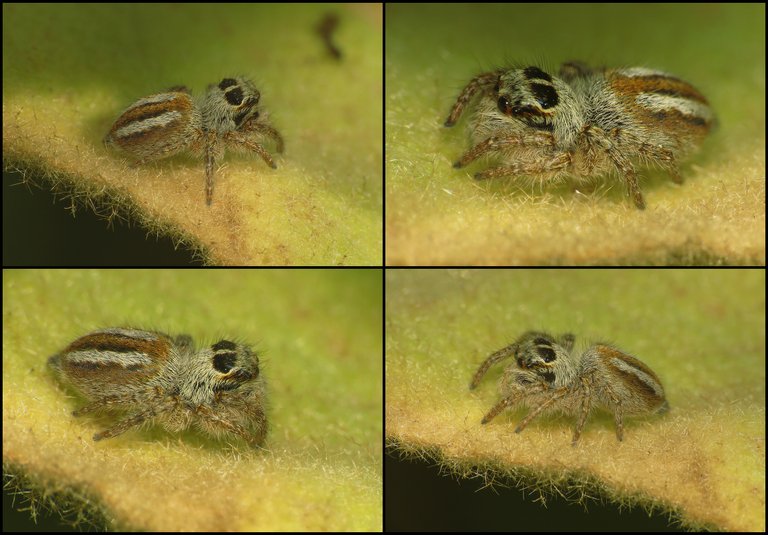
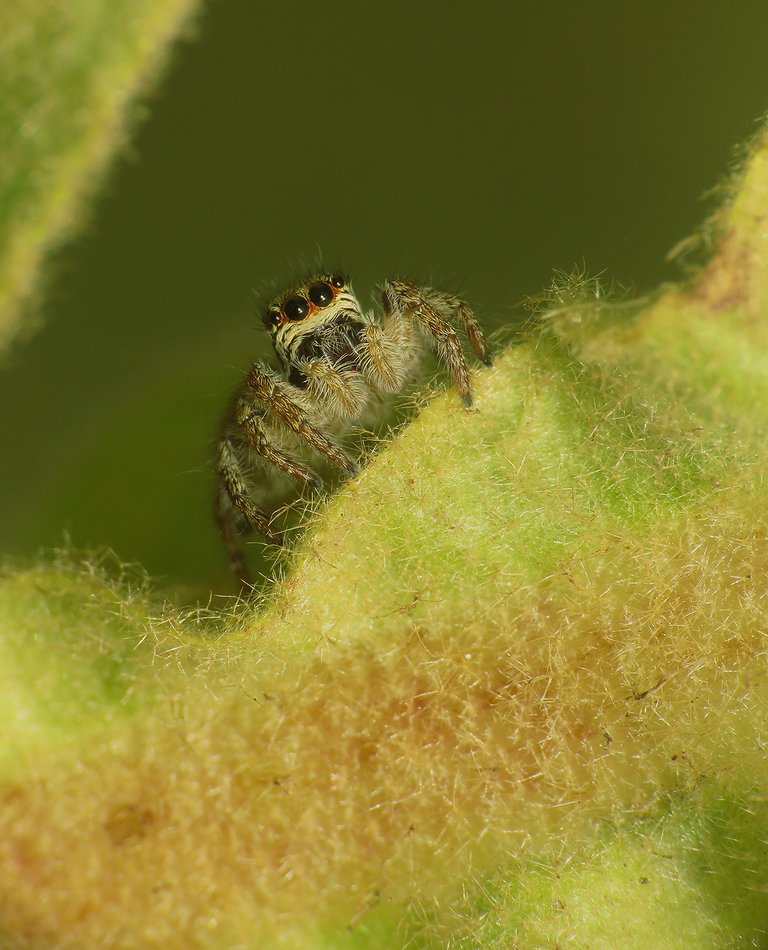

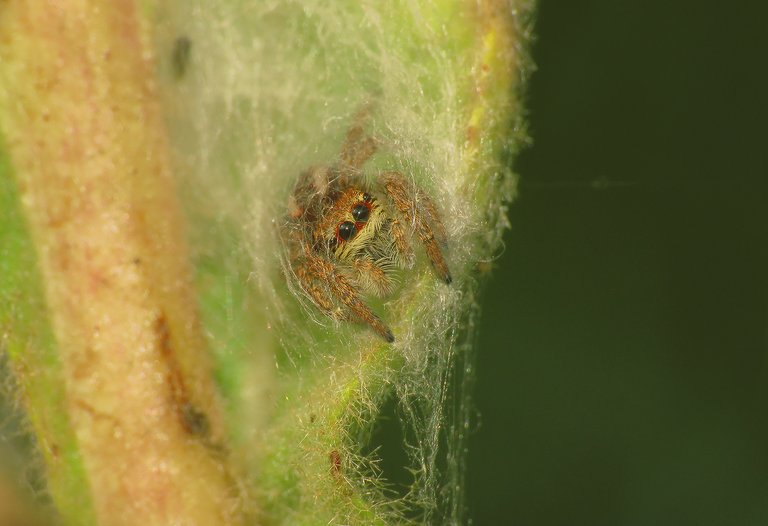

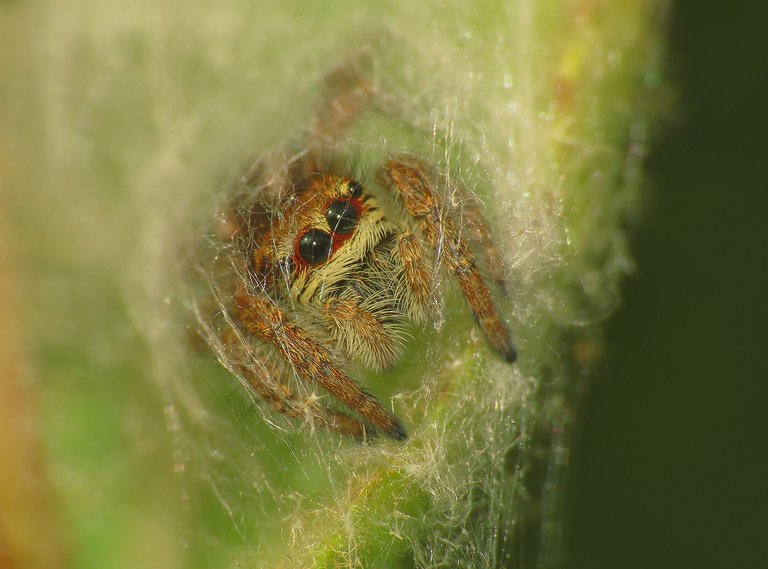

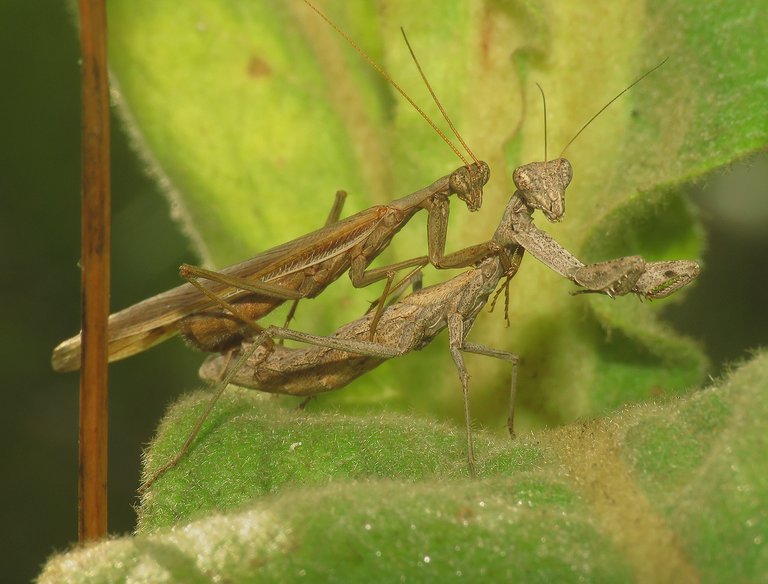

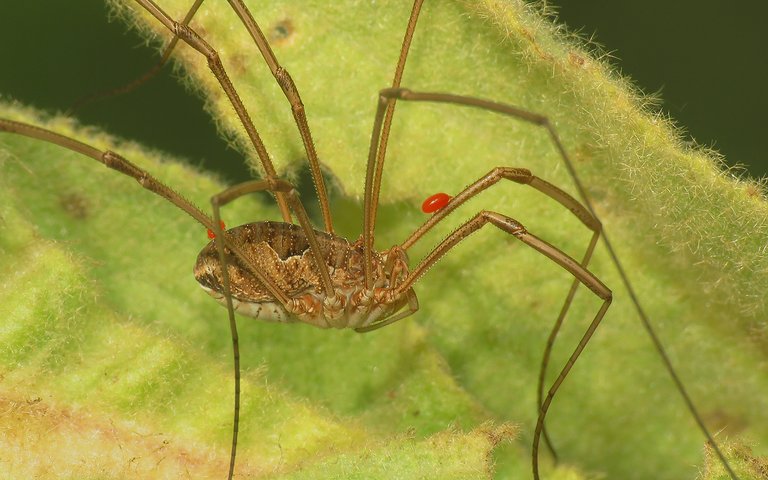

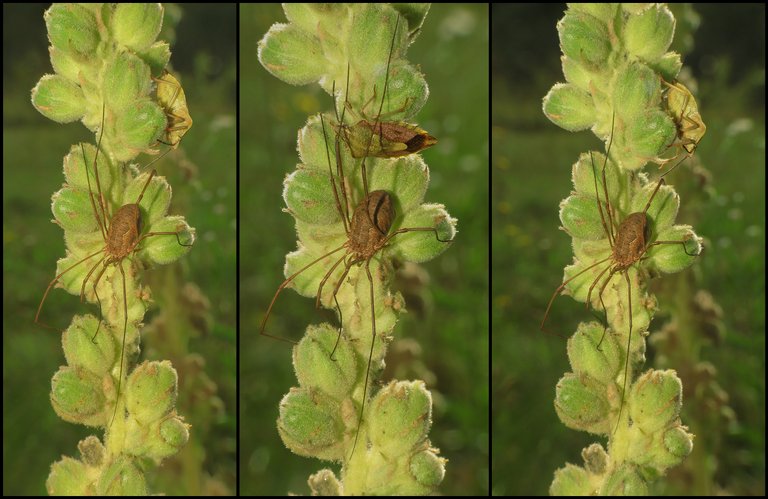


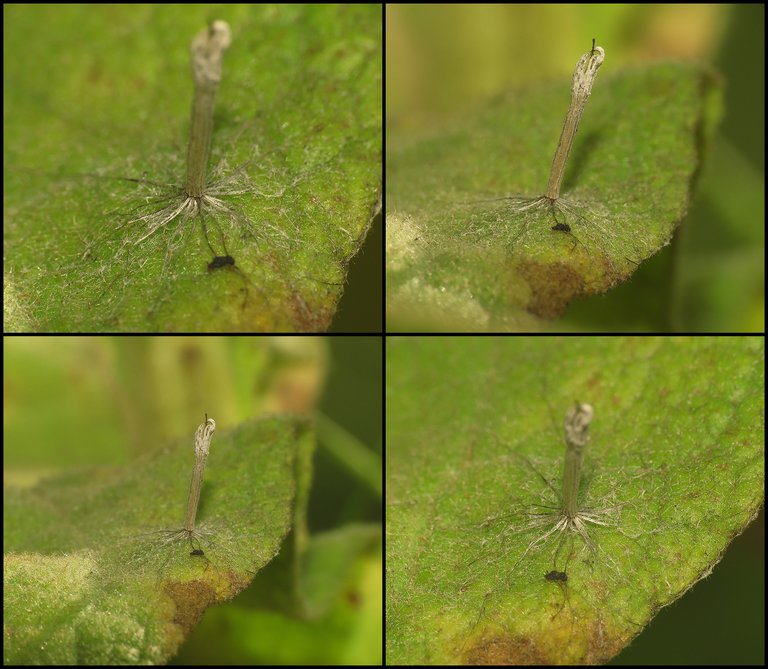
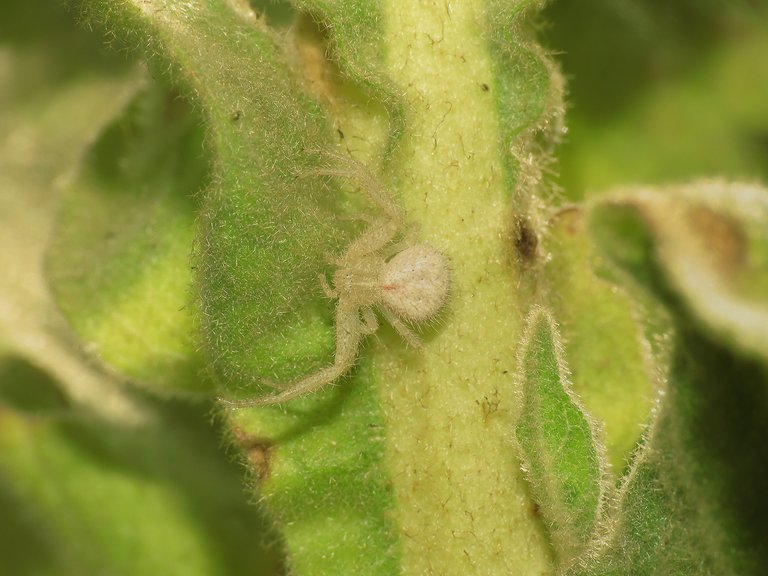

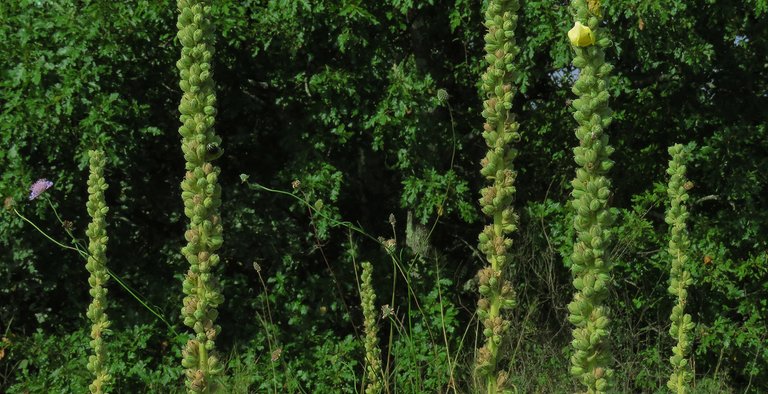
Wow gorgeous species.
Great work. You have a great variety of insects around you.
That's a lot of insects. The spider in the end can't be separated from leaves ; well camouflaged! Nice shots.
one of the species that is quite unique to witness. @borjan
You drove long distance, and captured and shared eye candies.
@tipu curate
Upvoted 👌 (Mana: 45/65) Liquid rewards.
I've said it before.. and I'll say it again and again! Jumping spiders are toooo adorable. Loved how you captured in its little web home. Fantastic!
It’s strange, but looking at the first photograph, the phrase flashed through my mind... “Home alone!”
Yes, it doesn't feel like Christmas, but this bug looks like Kevin that morning when he found out that everyone had forgotten about him and he was left at home alone, the spider and the wedding of the mantises, until the male loses his head, are wonderful :)
!ALIVE
@borjan! You Are Alive so I just staked 0.1 $ALIVE to your account on behalf of @ peter-stone. (9/10)
The tip has been paid for by the We Are Alive Tribe through the earnings on @alive.chat, feel free to swing by our daily chat any time you want, plus you can win Hive Power (2x 50 HP) and Alive Power (2x 500 AP) delegations (4 weeks), and Ecency Points (4x 50 EP), in our chat every day.

😃 Yes. The tiny droplets also look a bit like Christmas balls and shiny decorations.
The atmosphere completely matches the moment :)
!ALIVE
@borjan! You Are Alive so I just staked 0.1 $ALIVE to your account on behalf of @ peter-stone. (1/10)
The tip has been paid for by the We Are Alive Tribe through the earnings on @alive.chat, feel free to swing by our daily chat any time you want, plus you can win Hive Power (2x 50 HP) and Alive Power (2x 500 AP) delegations (4 weeks), and Ecency Points (4x 50 EP), in our chat every day.

Such a lovely macro studies. What I love a lot about those captures - are the beautiful textures and backgrounds.
...and amazing scale of magnification. I have met those too, exactly on the harvesters, but in my photos... they are not so visible, you can only notice them sitting, but cant watch their own look with detailes. Superb. !BEER
Thanks. 🙂 Sometimes I sucsesfully get a good shot of something so small ... but more often, I don't. 😃 This time the harvester was very calm and cooperative.
Let me guess: in the morning, with dew on the grass and cold temperature, they are more numb? (and cooperative))))
😃 Yes, they are great models when they are numbed down by the early morning conditions.
Sad thing, that during the proper conditions... in 100% cases I still sleep :D Have a lot of room to improve my macro skills in that direction! (and havent obtained Rainox 250 ... still)
🙂
View or trade
BEER.Hey @borjan, here is a little bit of
BEERfrom @qwerrie for you. Enjoy it!If you like BEER and want to support us please consider voting @louis.witness on HIVE and on HIVE Engine.
https://twitter.com/LovingGirlHive/status/1707335824008970718
With your photography, you have caught me in your web of enjoying insects. When you speak of the macro lens, is it another setting on your camera or do you physically change the lens on your camera? As you can tell, I'm a beginner at this photography stuff. I take all of my pics with a Cannon Power Shot SX530 HS. When I want to capture fine detail I just zoom in. Of course, my photos don't capture the detail your pictures show.
Being able to enlarge the pics is also very cool. The shots of the jumping spider, especially when enlarged are so vivid, showing every detail. I have seen a few Mantises around our farm. Here in the States we refer to them as the Praying Mantis. Back in the day, it was illegal to kill them and a hefty fine was imposed if you did. I'm not sure how the authorities would ever know back then, but now it may be a different story as there seem to be cameras everywhere recording your every move. Not so much in the rural area we live in, but in the larger cities you can see them everywhere.
Thanks for capturing my attention with your wonderful skills. I've got so much to learn!
I use a camera very similar to yours, the Canon PowerShot SX60 HS. For the macro, however, I combine it with a macro conversion lens with a snap-on adapter. Now, that's a lot of words but the thing is simple and easy to use. The exact name is Raynox DCR-250 Super Macro Snap-On Lens. It's a small addition to the lens of your camera that you can easily mount and unmount. Here is the link where you can see how it looks. https://www.amazon.com/Raynox-DCR-250-Super-Macro-Snap/dp/B000A1SZ2Y?th=1
Yes 🙂 it looks like one of those laws that isn't possible to monitor and enforce but it works more like a vague repellent for extremely honest, law-abiding people.
Yes, with modern cameras maybe they can zoom in enough to see you killing insects. Still, there are probably ways to kill a mantis discretely or make it look like an accident. Organized crime professionals will surely know a trick or two.
o-oo!
Thanks for the info and the link to the Raynox DCR-250 Super Macro Snap-On Lens.
I checked it out and Amazon has it for $67.00.
I've ordered it and can't wait for it to arrive.
Once it arrives, I don't mean to BUG you, but if I have any questions can I call on you to straighten me out?
Tough law to uphold, but just having this law in place is a good thing. If folks would realize that the Praying Mantis can act as an effective form of organic pest control they may think twice before sending it to its grave.
No problem. 🙂 I'll gladly answer any question about that macro lens, if I can.
THANKS
Wooooooo! Sun spider, I am just here to see how amazing you are so stop starring at me already 😀
These photos are amazing as always, the flower looks so unique on a closer look
😃
You are one of those who capture the best images on here
The pictures are beautiful
Nice one!
Thank you. 😃
https://twitter.com/lee19389/status/1707377309055865223
#hive #posh
The mantises or we are called kahoy-kahoy in our dialect (kahoy means tree). That was because the color blended well in trunk colors .
Though I am afraid of that insect before so didn't have a chance to see them mating!
Congratulations, your post has been upvoted by @dsc-r2cornell, which is the curating account for @R2cornell's Discord Community.
https://twitter.com/jewellery_all/status/1707424293691576693
What a diverse microcosm of life living on those fuzzy plants. I recognize that plant, too. It is invasive here, yet some caterpillars still eat it.
Yes, some insects adapt quickly to new stuff. 🙂 I see always plenty of local life around invasive plants from Central and North America here.
Ohhhh dudeeee those jumping spiders!! 😱😱🤗 Damn cute!!!!
@misshugo check them out!!!!!
😃
Yes!... Not for nothing are you my favorite macro photographer at #Hive!.... Big appaluse for you friend!!!
!discovery shots
!VSC
!PIZZA
@jlinaresp has sent VSC to @borjan
This post was rewarded with 0.1 VSC to support your work.
Join our photography communityVisual Shots
Check here to view or trade VSC Tokens
Be part of our Curation Trail
@jlinaresp ha enviado VSC a @borjan
Éste post fue recompensado con 0.1 VSC para apoyar tu trabajo.
Únete a nuestra comunidad de fotografía Visual Shots
Consulte aquí para ver o intercambiar VSC Tokens
Se parte de nuestro Trail de Curación
Thank you. 😃 That's a big compliment.
This post was shared and voted inside the discord by the curators team of Discovery-it in collaboration with Visual Shots community.
Discovery-it is also a Witness, vote for us here
Delegate to us for passive income. Check our 80% fee-back Program
Spiders give me the creeps (especially the one that jumps) !LOL
I've never owned a Macro lens, but your amazing photo results always make me think about investing in a more specialized lens. Especially for insects!
Awesome shots as always, and have a great day! VSC 👌
lolztoken.com
What does alcohol do?
Credit: reddit
@borjan, I sent you an $LOLZ on behalf of fun.farms
(4/10)
ENTER @WIN.HIVE'S DAILY DRAW AND WIN HIVE!
lolztoken.com
Thank you for being an !LOLZ supporter.
You must be killin' it out here!
@lolz.pimp just slapped you with 20.000 PIMP, @fun.farms.
You earned 20.000 PIMP for the strong hand.
They're getting a workout and slapped 4/4 possible people today.
Read about some PIMP Shit or Look for the PIMP District
Has sido curado por @visualblock / You've been curated by @visualblock
Bienvenidas delegaciones / Delegations welcome
Trail de Curación / Curation Trail
Vota por nuestro Testigo aliado - @hispapro / Vote for our allied Witness - @hispapro
Más información sobre el testigo aquí / More information about the witness here
What amazing photo